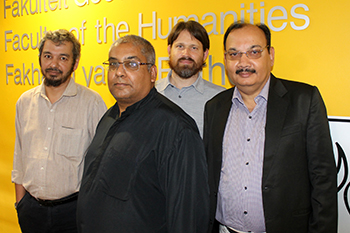Latest News Archive
Please select Category, Year, and then Month to display items
12 October 2020
|
Story Arina Engelbrecht
|
Photo Supplied
 Arina Engelbrecht from Organisational Development and Employee Well-being believes physical activity has a number of benefits for one’s health, including stress relief.
Arina Engelbrecht from Organisational Development and Employee Well-being believes physical activity has a number of benefits for one’s health, including stress relief.
Being physically active plays a big role in preventing the development of mental-health problems and in improving the quality of life of people experiencing mental-health problems.
Treatment for depression
Physical activity can be an alternative treatment for depression. It can be used as a stand-alone treatment or in combination with medication and/or psychological therapy. It promotes all kinds of changes in the brain, including neural growth, reduced inflammation, and new activity patterns are formed that promote feelings of calm and well-being. It releases endorphins – powerful chemicals in the brain that energise your spirit and make you feel good.
Physical activity can be very effective in relieving stress. Research in adults has found that physically active individuals tend to have lower stress levels compared to individuals who are less active. It also leads to improved sleep. When a person sleeps better and feels more rested, overall quality of life improves. They cope better with daily life stressors.
Reduce Alzheimer's risk
Regular physical activity can reduce your risk of developing Alzheimer's disease by up to 50%. It can also slow down further deterioration in those who have already started to develop cognitive problems. It stimulates the brain’s ability to maintain old connections as well as to make new ones.
A study asked people to rate their mood immediately after periods of physical activity (e.g. going for a walk/run, cycling, doing housework) and periods of inactivity (e.g. reading a book or watching television). Researchers found that participants felt more content, more awake, and calmer after being physically active compared to after periods of inactivity.
In conclusion, people who are physically active feel a sense of well-being, feel more energetic throughout the day, sleep better at night, have sharper memories, and feel more relaxed and positive about themselves and their lives.
“Being physically active not only changes your body, it changes your mind,
attitude, and your mood.” – Arina Engelbrecht
SA and Africa must avoid going over the edge
2017-02-26

From left are: Prof JM Moosa (Centre for African
Studies, Jawaharlal Nehru University, India),
Prof Hussein Solomon (Senior Professor: Political
Studies and Governance at the UFS),
Prof Virgil Hawkins (Osaka School of International
Public Policy Studies, Osaka University in Japan), and
Prof Ajay Dubey (Centre for African Studies, Jawaharlal Nehru
University, India).
Photo: Jóhann Thormählen
South Africa and the rest of Africa might be standing on the edge of a cliff and therefore conversations are necessary to avoid tipping over. According to Prof Hussein Solomon that was why a conference to address these issues was recently co-hosted by the University of the Free State (UFS).
Prof Solomon, Senior Professor of Political Studies and Governance at the UFS, said the continent and country needed to make the right decisions. “These right choices refer to the correct economic, political, and social policies.”
International delegates attend
Delegates from India, Japan, Zambia, Lesotho and South Africa attended the conference, called A View from the Precipice: Critical Reflections on South Africa and Africa in the 21st Century, on 13 and 14 February 2017 on the Bloemfontein Campus. It was co-hosted by the UFS Department of Political Studies and Governance, Jawaharlal Nehru University (India), Centre for the Engagement on African Peace and Security, Southern African Centre for Collaboration on Peace and Security and Osaka University (Japan).
Prof Solomon said external actors provided a useful mirror as they gave an idea of how Africa and South Africa were viewed from abroad.
Creating a knowledge-sharing forum
“It is not just about sharing knowledge, but creating a forum for sharing knowledge,” said Prof Virgil Hawkins from the Osaka School of International Public Policy Studies.
Prof Hawkins, who is a visiting professor at the UFS, said a conference like this was one of the cornerstones of the relationship between the UFS and Osaka University. Prof Solomon is also a visiting professor at last mentioned university.
Highlights of conference
Prof Solomon said some of the discussions included that “the ANC government is in crisis and is dragging the rest of the country with it”. Another participant said that 80% of the jobs in the next 20 years had not been created yet – which put the relevance of tertiary education in the spotlight.